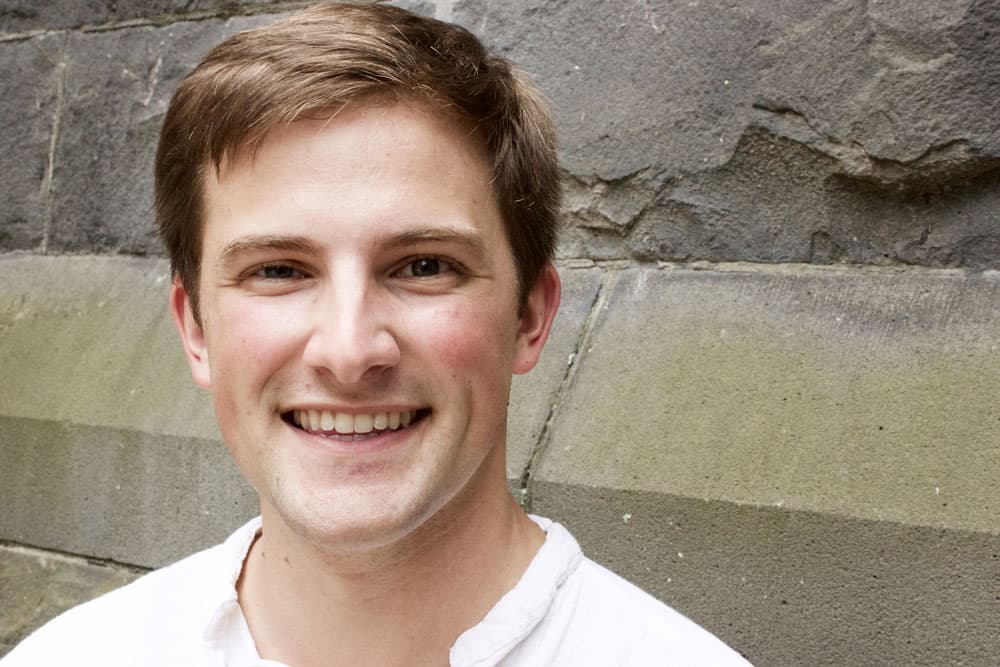- Legacy Blog
- The Void Laughs Back: Nietzsche and the Church of Improv
Thursday, December 3, 2015
The Void Laughs Back: Nietzsche and the Church of Improv

In the beginning there was the Yes. And the Yes was good. The Yes yessed, and from within that yessing was beget an And. And that And anded the Yes, for anding was its own yessing. And so the And begat the Yes which begat the And, and so on until the Edit. —The Book of Improv 1:1-5
 People often joke about the improv world being a cult. That’s an easy dig and not always unwarranted. If the Training Centre replaces the cooler water with Kool-Aid I will concede the point. After a year and a half with The Improv Conspiracy as a student, performer, and now assistant teacher, though, I’m more inclined to call improv a religion or philosophy instead.
People often joke about the improv world being a cult. That’s an easy dig and not always unwarranted. If the Training Centre replaces the cooler water with Kool-Aid I will concede the point. After a year and a half with The Improv Conspiracy as a student, performer, and now assistant teacher, though, I’m more inclined to call improv a religion or philosophy instead.
If that leaves you throwing up in your mouth a bit, stay with me! Do you sometimes cringe when your teachers or friends said things like “Good improv advice is good life advice?” Is that too reminiscent of things like smarmy self-help books and snake-charming mega-churches in Texas? Instead of pushing that notion aside, let’s go to church for a minute.
Think about how we teach and learn improv. Odds are if you have ever taken a class you have heard some version of these phrases and many more besides:
- “There are no mistakes. Only opportunities.”
- “It’s about the relationship.”
- “Say the thing.”
- “Play to the height of your intelligence.”
The first two are basically axioms. Philosophers and theologians use them all the time. Axioms assume things to be true without need for proof. The second two are basically commandments. They are imperatives: DO this. Our improv lessons and books are filled with both, in spite of all disclaimers. Is it a coincidence of English language that teaching someone “how to act” applies to both religion and improv?
It’s no coincidence that, like religion, improv seeks the help of other disciplines (like disciples, no?) to deliver its message. There is a periodic table of improv elements. Improv companies all over the world are running business-oriented workshops and professional development seminars. Improv pedagogy is its own competitive marketplace now, with numerous service providers to choose from (like church services? Too far?) .
We have our (mad) rituals and our ceremonies, our gathering places and our holidays (Improvention, Camp Improv Utopia, etc.). We make pilgrimages to Chicago, LA, and New York to meet our idols. We evangelize. We form communities for support in difficult times. We have our prophets and their books. We have talk radio.
Most fun for me, however, is that we also share a philosophy. As it turns out, that philosophy is much older than Del Close. We can turn to another old crank with epic facial hair. Enter Friedrich Nietzsche, stage left:
“This final, most joyful, most excessively-exuberant yes to life is not only the highest insight, it is also the deepest, the one most strictly confirmed and supported by truth and science.” (From Ecce Homo)
Nietzsche called his philosophy a “philosophy of Yes.” That might be surprising to hear. After all, people rock Fast Freddy in their kewl emo days with hot takes like:
“And if you gaze long enough into an abyss, the abyss will gaze back into you.”
It’s a great quote, radiating unfathomable darkness and angsty profundity. You nod and pull out your worn copy of The Watchmen because you get it. It isn’t quite the whole story, however, given the guy’s real advice on what to do with the good ole void:
“Into all abysses I still carry my blessed Yea-saying.”
Laugh, and the void laughs back. In the beginning was the Yes.
When we step on stage alone, we step into chaos. It may seem quiet and inert, but as any improviser—especially a beginning one—will tell you, it can stifle us with the noise of its possibilities. It can also drain us dry with its call to be (impossibly) filled with words. We freeze with fear or desperately talk for a long time before it hits us: just say yes.
“Yes” isn’t just a response to a player. It is an affirmation in the silence. Nietzsche, echoing his favourite beard-tastic ancient Greek philosopher, Heraclitus, called this becoming rather than being. That’s what you do every instant on stage: you become. Maybe you were going to be a checkout clerk at Coles until your stage partner blurted out that she was pregnant. That matters little now that you’ve become empathetic Aunt Dianne in the Crown Casino toilets during the Wilson family reunion. Who knows what will become of that?
I like to think this is why we can actually stomach so many structural similarities with often-notorious systems of belief like religion, or even their culty cousins. The philosophy at the centre of these structures must inherently accept change and flux, the enemies of doctrine and stasis. If “Yes” is the order at the centre of chaos, then “And” is the chaos within that order—the possibility for change within the same. It’s the one lesson we can stand to learn over and over. Nietzsche might call that process an “eternal return.”
We’ll call it 12 easy payments of $299.95! Don’t forget to pick up your robes at the door and watch out for the snakes! [sips Kool-Aid]
Previous Post
NervesNext Post
Take A Break!